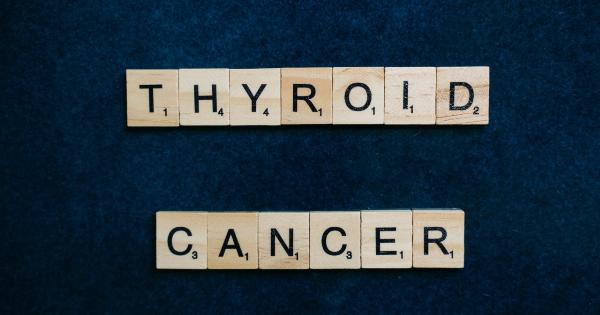Thyroid cancer is a type of cancer that originates in the thyroid gland, which is located in the neck.
It is often referred to as the silent killer among women because the symptoms can be subtle or easily overlooked, leading to a delayed diagnosis and more advanced disease. In this article, we will explore the causes, symptoms, diagnosis, treatment, and prevention strategies for thyroid cancer.
What Causes Thyroid Cancer?
The exact cause of thyroid cancer is unknown. However, certain risk factors have been identified, including:.
- Exposure to high levels of radiation, particularly during childhood
- A family history of thyroid cancer
- Having certain genetic conditions, such as familial medullary thyroid cancer syndrome or multiple endocrine neoplasia
- Being female, as thyroid cancer is three times more common in women than in men
- Age, with the risk increasing as individuals get older
Signs and Symptoms
Thyroid cancer may not cause any noticeable signs or symptoms in its early stages. However, as the disease progresses, the following signs and symptoms may occur:.
- A lump or swelling in the neck, which may sometimes be painful
- Difficulty swallowing or a feeling of a lump in the throat
- Changes in voice, such as hoarseness
- Neck or throat pain that doesn’t go away
- Enlarged lymph nodes in the neck
It is important to note that these symptoms can occur due to various other conditions, not just thyroid cancer. However, if you experience any of these symptoms, it is essential to consult a healthcare professional for proper evaluation and diagnosis.
Diagnosis
When evaluating a patient for thyroid cancer, the healthcare provider may perform several tests, including:.
- Physical examination: The healthcare provider will examine the neck for any abnormalities, such as lumps or swelling.
- Thyroid function tests: These blood tests measure the levels of thyroid hormones and assess thyroid function.
- Ultrasound: A thyroid ultrasound uses sound waves to produce images of the thyroid gland, allowing the healthcare provider to evaluate the size and structure of any nodules or masses.
- Fine-needle aspiration (FNA) biopsy: This procedure involves using a thin needle to extract cells from a thyroid nodule or mass for further analysis under a microscope.
- Other imaging tests: In some cases, additional imaging tests such as a CT scan, MRI, or radioactive iodine scan might be ordered to determine the extent of the disease and assess for any spread to other parts of the body.
Treatment
The treatment of thyroid cancer depends on various factors, including the type and stage of cancer, as well as the patient’s overall health. The main treatment options for thyroid cancer include:.
- Surgery: Surgical removal of the thyroid gland, known as a thyroidectomy, is a common treatment for thyroid cancer. The extent of surgery may vary depending on the size and spread of cancer.
- Radioactive iodine therapy: After surgery, radioactive iodine may be administered to destroy any remaining cancer cells or thyroid tissue.
- External beam radiation therapy: In some cases, high-energy X-rays or protons may be used to kill cancer cells or shrink tumors.
- Chemotherapy: Although not commonly used for treating thyroid cancer, chemotherapy drugs may be prescribed in certain situations, such as when the cancer is advanced or has spread to other parts of the body.
- Targeted drug therapy: Some patients with advanced thyroid cancer may benefit from targeted drugs that specifically attack cancer cells.
Prevention
While it may not be possible to prevent thyroid cancer entirely, there are certain steps individuals can take to reduce their risk:.
- Avoid excessive exposure to radiation: Minimize exposure to unnecessary diagnostic tests involving radiation, and protect yourself from environmental sources of radiation.
- Regular self-examination: Perform monthly self-examinations to check for any changes or abnormalities in the neck area. If a lump or swelling is detected, seek medical attention promptly.
- Regular check-ups: Routine visits to a healthcare professional can help detect thyroid cancer in its early stages or identify any risk factors that may require further evaluation.
It is important to remember that these prevention strategies can lower the risk, but they do not guarantee the prevention of thyroid cancer. Consulting with a medical professional is crucial for personalized advice and appropriate screening.



























